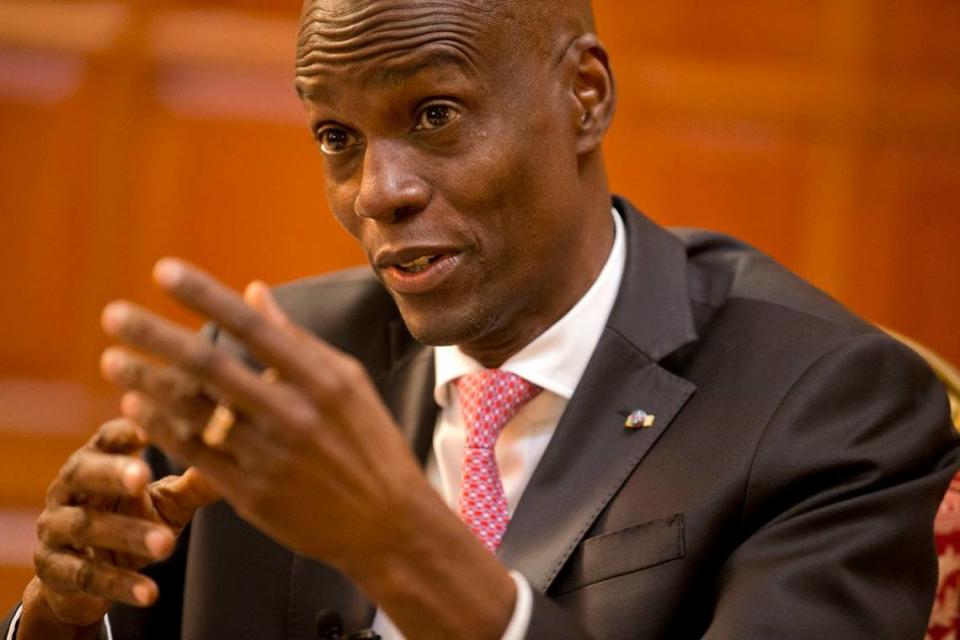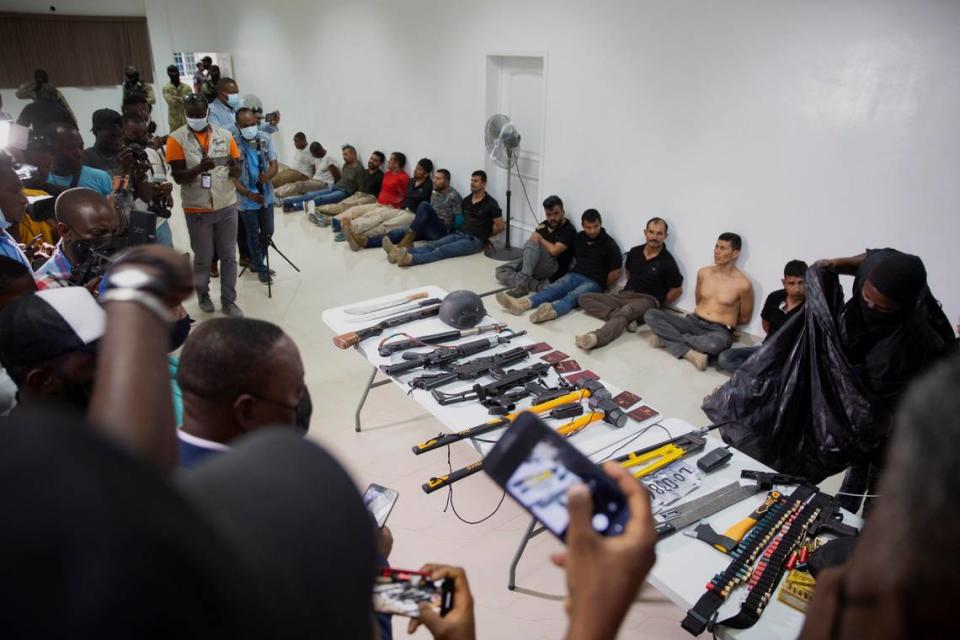Haitian businessman who provided weapons, lodging in plot to kill Moïse gets life in U.S.
A Haitian businessman who admitted to providing weapons, lodging and money in the plot to kill Haiti’s president, Jovenel Moïse, almost two years ago was sentenced Friday to life in prison.
Rodolphe Jaar, 51, became the first among nearly a dozen defendants charged in the alleged murder conspiracy to be sentenced in connection with the assassination case in Miami federal court. The deadly plot revolved around suspects collaborating in South Florida, Haiti and Colombia to kidnap and then kill Haiti’s leader, according to federal authorities.
In March, Jaar pleaded guilty to three counts of conspiring to provide material support, providing material support and conspiring to kidnap and kill Haiti’s president — each of which carried a potential life sentence. Under his plea agreement, he faced between 30 years and life.
In light of the life sentence given by U.S. District Judge Jose E. Martinez, it remains to be seen how many other defendants charged like Jaar would be willing to cut plea deals if they end up receiving the same harsh punishment. In April, Martinez took prosecutors with the U.S. Attorney’s Office to task for requesting a delay in the trial as the judge noted that a few of the defendants have been in custody for more than a year. Nonetheless, Martinez postponed a trial date for this spring until a future date.
READ MORE: Who was involved in killing of Haiti president Jovenel Moise?
Jaar, who has a cocaine-trafficking conviction from a decade ago, was the first of nearly a dozen suspects in U.S. custody to enter a guilty plea in the July 7, 2021, middle-of-the-night assassination of Moïse at the president’s home in a Port-au-Prince suburb.
By entering his plea, Jaar, who also holds Chilean citizenship, was hoping to avoid a life sentence. But on Friday, in a hearing that lasted only 10 minutes, Jaar received just that in a Miami federal courtroom when Martinez sentenced him to life on each of the three counts. The terms are to be served concurrently.

Jaar’s defense attorney, Frank Schwartz, argued in a filing and in court that his client should receive the benefit of the terms of his plea agreement, which recommended imprisonment for 30 years to life, giving the judge some discretion to go with the lower sentence. But the federal probation office, in an advisory report to the judge, found that Jaar scored out at the highest level on the sentencing guidelines and therefore should be sentenced to life. Federal prosecutors Monica Castro and Andrea Goldbarg also recommended life imprisonment.
Schwartz noted in the filing that Jaar was expected to receive a recommendation for a sentence reduction from the prosecutors for his cooperation in the complex assassination case, which spans several countries and includes a voluminous amount of discovery in several languages.Schwartz reserved his right to argue on his client’s behalf until the sentence reduction was recommended.
In all, there are 11 suspects in federal custody in Miami, accused of coordinating various aspects of the plot that left Moïse dead with a dozen gunshot wounds when Colombian commandos stormed his compound in Pétionville and allegedly entered his home with the “intent and purpose of killing” him, according to an FBI affidavit.
The defendants have all been charged by indictment after either being transferred to the United States from Jamaica, where two suspects fled to after the killing, or the Dominican Republic, which is where Jaar fled after months in hiding in Haiti. Three Haitian Americans with ties to South Florida were flown from prison in Port-au-Prince earlier this year.

Three others in custody were arrested in February in South Florida. They are accused of playing central roles in the plot, focusing on the weapons, ballistic vests and financing that authorities say fueled the deadly scheme. Three of the defendants — Antonio Intriago, owner of Doral-based Counter Terrorist Unit Security, or CTU; Arcángel Pretel Ortiz, operator of the affiliate CTU Federal Academy LLC; and Walter Veintemilla, head of Miramar-based Worldwide Capital Lending Group — are charged with supporting a conspiracy to kidnap and kill Moïse.
READ MORE: How a Miami plot to oust a president led to a murder in Haiti
During his March court appearance, Jaar admitted providing “material support” in a conspiracy to kidnap Moïse, which would evolve into a murder. He was asked at that time by the judge if he “provided funding to bribe certain Haitian officials who were responsible for providing security to President Moïse so that Jaar’s co-conspirators would be able to obtain access to [him] during the operation.”
Jaar replied: “Yes, your honor.”
In Haiti, meanwhile, the assassination remains under investigation. There are more than 40 people who have been arrested, including 18 Colombians. Former members of their country’s military, the Colombians have claimed they were set up, saying they’re not guilty of killing Moïse and wounding his wife, former first lady Martine Moïse .
The Haitian investigation, now on its fifth judge, has made little progress and been riddled with problems after the first judge was not allowed to continue with the case and was later sanctioned for corruption connected to his probe.
On Thursday, former opposition Haitian Senator Nènel Cassy became the latest politician on a list of former senior government officials to appear before Investigative Judge Walter Wesser Voltaire for questioning as part of his effort to learn who killed the president and why.
“This is a dossier that I have nothing to do with,” Cassy, a staunch opponent of the late president, said after emerging from the judge’s office. “I believe today we have other concerns, and our concerns are clear: There are people who were in charge during Jovenel’s assassination and I always said those people have to talk and I hope those people come to the [judge’s chamber] so they can come speak also.”
Cassy, who was sanctioned last year by Canada for unrelated allegations, went on to denounce his summons, saying that it was a political maneuver to keep him away from political negotiations. Since Moise’s assassination, Haiti has been without an elected president and today it has no parliament. Gang violence, kidnappings and other turmoil have destabilized the country.
Some 30 government and political leaders have been invited to Jamaica to participate in discussions in hopes of forging a political resolution in Haiti.

